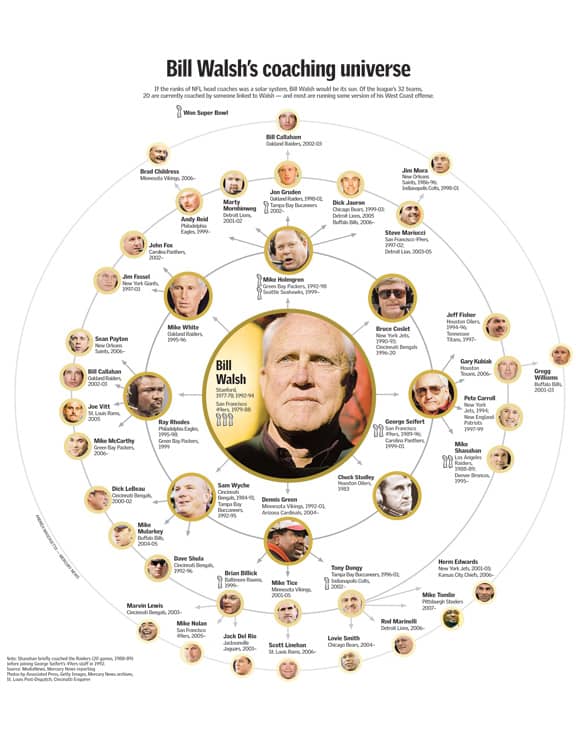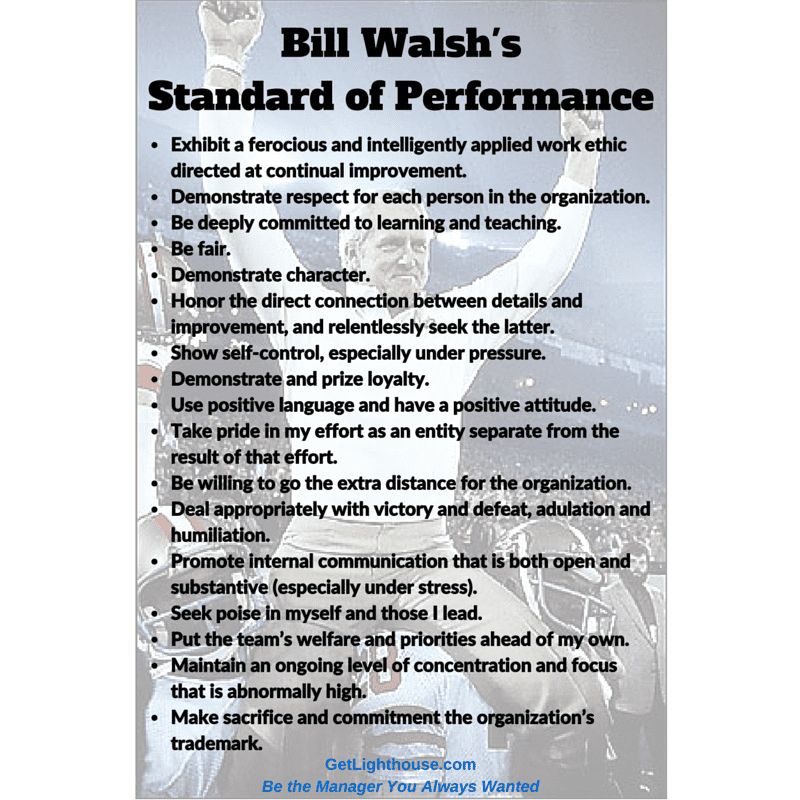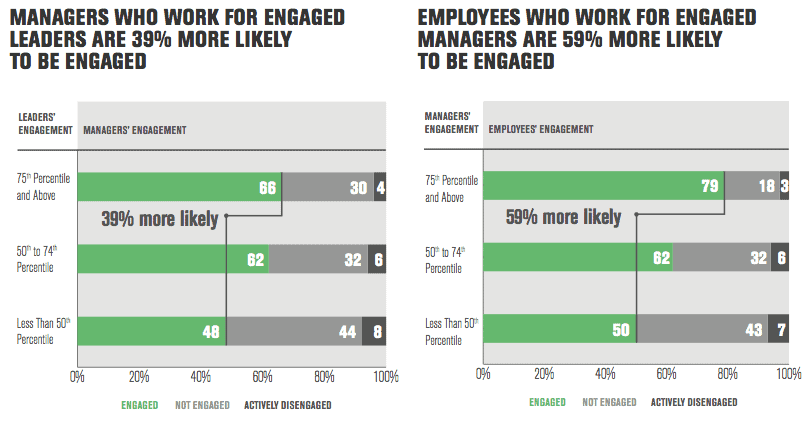Bill Walsh is one of the greatest coaches in NFL history. When he took over the San Francisco 49ers, they were the worst team in the league with a 2-14 record. Within 2 years, they were the best team in football, winning the Super Bowl, and becoming a dynasty, winning 4 titles over the next 10 years.
What makes Bill Walsh's career even more impressive is that he not only built a winning team, but developed an incredible 8 future head coaches, who developed another 35 future NFL head coaches:
It's a simple reminder that the highest level of leadership is making more leaders.
Fortunately for us, developing leaders did not stop in the locker room. Walsh's lessons in leadership have been also captured in the book, "The Score Takes Care of Itself" which is a must read even if you have no interest in football.
In Silicon Valley, it's become particularly loved as Jack Dorsey, founder of Square and co-founder of Twitter, has quoted it at Startup School, and many have read it at his recommendation:
Reading "The Score Takes Care of Itself" by Bill Walsh on the trip. HT to @jack for the recommendation. Anyone else read it before?
— Ryan Sarver (@rsarver) August 5, 2011
Having recently read "The Score Takes Care of Itself" for the second time, I wanted to share some of the best excerpts. The following Bill Walsh quotes are my favorites from the book, which has a lot more depth and ideas well worth learning for any manager or leader.
Table of Contents:
- Praise is one of the best tools at a leader's disposal
- Preparation and planning for all possible outcomes is critical
- Leadership is about the example you set and the culture you create
- Your enthusiasm is contagious and essential to teaching
- Use the four most powerful words in a manager's arsenal
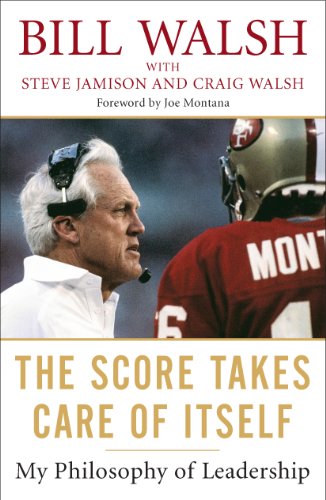
5 Key Bill Walsh Quotes on Leadership from The Score Takes Care of Itself
With each The Score Takes Care of Itself Quote in this blog, we're including an actionable tip you can apply to your team, as well as a further reading section with resources on how to get even better in those areas. Let's jump right in.
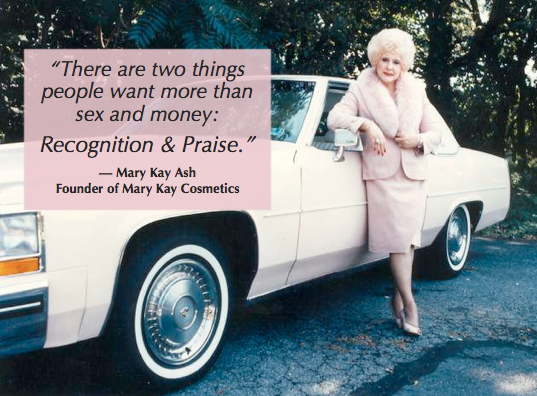
1) Praise is one of the best tools at a leader's disposal.
"Few things offer greater return on less investment than praise."
Bill Walsh expected his people to strive for perfection in their craft. Whether they were working in the 49ers front office or a receiver running a precise route, Walsh applied his Standard of Performance to everyone's work.
While Walsh spent a lot of time coaching people and setting expectations, he was sure to praise people for good work. He used it as an opportunity to show them an example of what he wanted everyone to strive for, while also helping people feel good about the effort they put in to achieve their great work.
Praise was a crucial ingredient to Walsh's success. Think back to the last time you worked really hard on a project and no one noticed. How did that make you feel? It probably didn't make you want to do it again.
Now compare that to the last time someone did recognize your hard work. I bet you were a lot more motivated to keep up the same effort for them. Make sure you do the same for your people.
The value of praise isn't just anecdotal, either. As we covered in our post on giving effective praise, research shows praise has a real, measurable impact:
- "Getting "praise or recognition for good work” increases revenue and productivity 10% to 20% and that those feeling unrecognized are three times more likely to quit in the next year."
- Have you praised your people lately? Can you afford not to?
- Managers who praise their teams experience 59% less turnover, according to the research conducted by the company O.C. Tanner.
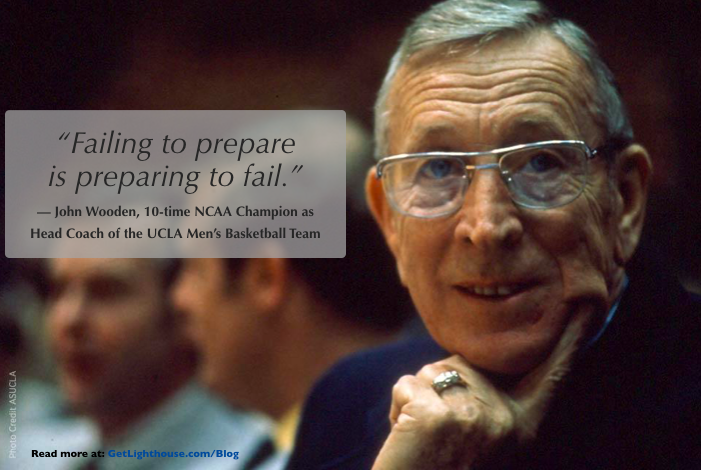
2) Preparation and planning for all possible outcomes is critical.
"Hearing someone described as being able to "Fly by the seat of his pants” always suggests to me a leader who hasn't prepared properly and whose pants may soon fall down."
Walsh was obsessed with preparation. He invented the now common practice today of scripting the first 10-12 plays on offense for a football team. He thought about every contingency he could think of because as he learned the hard way, "the more thorough, the more extensive, the more rehearsed, the better you perform under the pressure of any situation that calls for an immediate decision."
When Walsh was an offensive coordinator, he once was playing a road playoff game in front of crazy Oakland Raider fans who were yelling, throwing things, and generally being chaotic around him in the coach's booth. When his team got the ball with little time left instead of calling the right plays to help them tie the game and force overtime, he froze.
His poor play calls cost his team a chance to advance to the AFC Championship game. From that point forward he swore he would always be ready for anything so the chaos of a moment never clouded his judgment.
"When you prepare for everything, you're ready for anything."
Most of us will never coach in a high stakes, professional football game, but we still face unexpected, high pressure situations where the right preparation can save you. Here's a few questions that you may face as a manager, and a good answer can really save you. What would you do if...
- Your best employee walked in and told you they were quitting?
- You lost your biggest customer to your main competitor?
- Your product failed in a major way (lost customer records, database failure, product stops working for days)?
- You suddenly closed a customer 10x bigger than your current largest customer?
- You had an extra $1 million in your budget?
These kinds of questions are regularly asked at some of the best and fastest growing companies in the world.
Netflix has developed their own "Chaos Monkey" to randomly take down some of their servers to ensure their engineers build perfect redundancy, so they never have a failure impact customers.
Meanwhile, Zenefits literally doubled their sales plan halfway through the year just to see how the thought exercise might push them (and it worked!).
Whether it's a sudden move by a competitor or a rowdy football crowd and the ball on your own 10 yard line, challenging yourself and your team to think through contingencies helps everyone be more flexible and prepared when everything doesn't go to plan.
Just like Netflix and Zenefits, and especially in times like these, you need to challenge yourself by preparing for every scenario conceivable. You need to think ahead and prepare in areas discussed in Gallup’s survey. To help you do that, we’re sharing a couple of guides on how to overcome challenges in times of chaos:
- Crisis Leadership: 29 Questions to Ask Your Team in a Crisis
- Leading Happy Teams: 5 Ways to Keep Your Team Happy in a Recession

3) Leadership is about the example you set and the culture you create.
"Others follow you based on the quality of your actions rather than the magnitude of your declarations."
You can't walk in a room and say, "I am the leader!" and expect people to follow you. That's more likely to get an eye roll.
The way you get others to follow you is demonstrating you deserve to be followed. As head coach of the 49ers, Bill Walsh spent much of his time teaching everyone his standards and using his sharp football mind to make everyone better.
Doing so gave him the credibility and respect that allowed his team to buy into his ways, even when everything looked hopeless in his first 2-14 season.
"Culture precedes positive results."
Walsh had many moments of doubt in his first two seasons with the team. He really wasn't sure if it would all work out, especially as they endured an 8 game losing streak at one point.
However, after persevering and building a championship roster, Walsh realized all the culture change he brought to a laughingstock organization was the foundation for their later success.
During those first two seasons, Walsh not only taught his Standard of Performance, he was getting buy in from players to his methods. Those that didn't agree were let go, no matter their talent, so that everyone could move together as one.
As he put it, "When you know that your peers - others in the organization - demand and expect a lot out of you and you, in turn, out of them, that's when the sky's the limit." And that standard started with the example Walsh set as head coach.
For those of you who are a fan of Jim Collins's classic, "Good to Great", this should sound familiar. It's very similar to his "on the bus" concept:
"The executives who ignited the transformations from good to great did not first figure out where to drive the bus and then get people to take it there. No, they first got the right people on the bus (and the wrong people off the bus)"
As a leader, Walsh recognized he needed to earn the respect of the team. That came by setting a great example, and making sure he had the right people on the team to reach their goals. Initially, a Super Bowl championship may have seemed crazy to aim for, but his commitment to excellence caused others to follow him and eventually aim for and reach that goal.
Are you setting the right example for the culture you want your team to have? Do you have the courage to remove those that undermine or oppose your culture so everyone can move in unison?
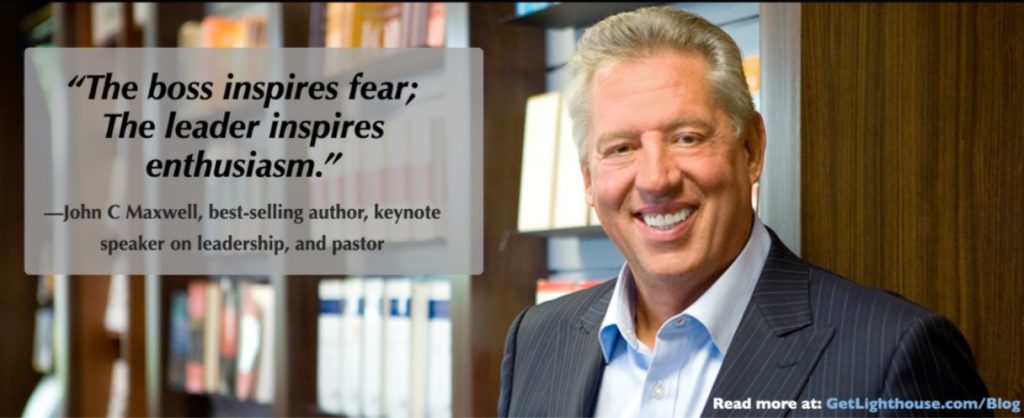
4) Your enthusiasm is contagious and essential to teaching.
"Your enthusiasm becomes their enthusiasm; your lukewarm presentation becomes their lukewarm interest in what you're offering....When the audience is bored, it's not their fault.
Walsh loved teaching people and spent a lot of his time in "The Score Takes Care of Itself" emphasizing how important a skill it is for leaders.
One of the key times he was such a teacher was when he would go over the plays to start their next game (remember the importance of preparation?). It could have been really easy to be boring while going over scripted plays in a dark room. Instead, Walsh mustered all his enthusiasm to get them excited about the plays by saying things like:
- "Guys, this one should knock'em on their asses!"
- "I think we're gonna have some fun with this one. It's a beauty."
- "Fellas, this one should score. No question about it."
Of course, it helped that Walsh loved what he was doing, so he really was passionate about the plays he drew up. He was then putting in the effort to be sure he shared that enthusiasm with the team.
Now, instead of Walsh's exciting play diagramming, imagine someone presenting a boring PowerPoint deck in a monotone voice. If you can't get excited about something, how can you expect your people to?
Enthusiasm is not just for football.
Just because your company doesn't play in front of 65,000 screaming fans, doesn't mean you can't bring some excitement. Tap into what you love about your job and the company you work for.
You may be surprised by the results you see from your team. And if you can't get excited, just realize that your feelings are contagious, as we learned from Gallup's study of American managers earlier this year:
Research from Zenger Folkman, a company that focuses on providing corporate leadership, also correlated assessment data from three organizational levels to look at the cascading impact of senior leader effectiveness on their direct reports and in turn on the next level below them.
As the article from "Forbes" on Zenger Folkman's findings points out: "great leader can have powerfully positive effects on an organization: decreasing turnover of team members and greatly increasing customer satisfaction, profitability, employee engagement, sales revenue, and even workplace safety----virtually every business outcome that’s measureable."
The study found that managers who worked for the worst executives ranked in the bottom 25% for engagement. Meanwhile, managers working for the best executives were the opposite, as shown by this chart:
Bringing enthusiasm to your work is an underrated skill as a leader. And just as Bill Walsh learned of it's importance as he made the 49ers great, another organization not far from the 49ers headquarters learned the lesson as well.
Over at Pixar Studios, Ed Catmull realized that with the ongoing success of their films, they had to start developing the next generation of leaders and great directors for their films. And with that realization came the insight to the important pairing of passion and teaching others, as he shared in "Creativity, Inc":
"As leaders, we should think of ourselves as teachers and try to create companies in which teaching is seen as a valued way to contribute to the success of the whole...One of the most crucial responsibilities of leadership is creating a culture that rewards those who lift not just our stock prices but our aspirations as well."
Do you invest time in teaching your people? Are you enthusiastic and passionate when you do?
Further reading:
- Leadership Lessons: How to Overcome Your Personal Weaknesses
- How Mindfulness Can Make You a Better Manager, boost your mood, and indirectly help your team
- Workplace Stress: 8 Ways to Reduce Stress in the Workplace Today to deal with the things that can affect the positivity of your leadership

5) Use the four most powerful words in a manager's arsenal.
"You need to stretch people to help them achieve their full potential...the most powerful way to do this is by having the courage to say, "I believe in you." These four words constitute the most inspirational message a leader can convey."
Joe Montana, arguably the greatest quarterback in NFL history, was not a legend from day 1. In fact, he wasn't even drafted until the 3rd round and many scouts were down on him. However, Walsh saw something in Montana and made sure "in word and in deed" that Montana knew how much he believed in him.
As Walsh said that to more players and backed it up in how he taught them to get better and pushed them to excel, he brought out greatness in them; during his time as coach, he developed 6 future members of the Hall of Fame, and countless stars. As Walsh put it was, "one of the things I love most about leadership - teaching a person how to reach high and higher, to achieve great things with his or her talent."
You can do the same.
Do you look at your team and only see the skills they have today, or do you consider their potential to do more? There is an incredible opportunity to tap into their deepest motivations if you believe in your team.
Believing in them gives them a purpose and a standard to constantly strive for. As this article in HBR points out, this is hugely important for them as they know why their work matters to the rest of the company.
Omid Scheybani worked at Google for over 6 years and during that time he had managers that deeply believed in him and helped him grow, even when it did not directly benefit them. The reward that his managers received was more than any manager can ask for as Scheybani wrote:
"I saw how truly caring about someone as a person could unlock an infinite amount of trust and authenticity. It could tear down walls of fear and bridge oceans of uncertainty. Seeing how my manager wanted the best for me was my biggest motivation to exceed his expectations day after day after day.
Do you believe in your people and demonstrate it in your words and deeds?
---
Take Bill Walsh's "The Score Takes Care of Itself" Quotes to the next level with the best tool for managers
These are just a few of the amazing leadership lessons found in "The Score Takes Care of Itself." If you haven't read it, I highly encourage you to read it and deeply consider the great lessons that Bill Walsh has shared with us about building world class teams.
Love sports and their great metaphors for leadership? You can read more inspirational sports lessons below:
Basketball:
- The 8 Best John Wooden Quotes You Can Use Today
- Red Auerbach's Leadership Secret to Winning 9 Titles in 11 Years
Baseball:
- Sports Leadership Lessons from the 2004 Boston Red Sox
- Data Driven & Emotionally Intelligent: Keys to the Red Sox Championship
- Employee Development Plans: Your Competitive Edge for a Winning Team
- How Cultural Change Helped Theo Epstein Break a 100 Year Curse
- Data Driven & Emotionally Intelligent: Keys to the Red Sox Championship
Football:
Soccer:
- Alex Ferguson: My Autobiography, the biography of Man United's legendary manager and one of the most influential thinkers in football
- Klopp's Promise, a documentary about how German coach Jurgen Klopp turned Liverpool into a serial winner

